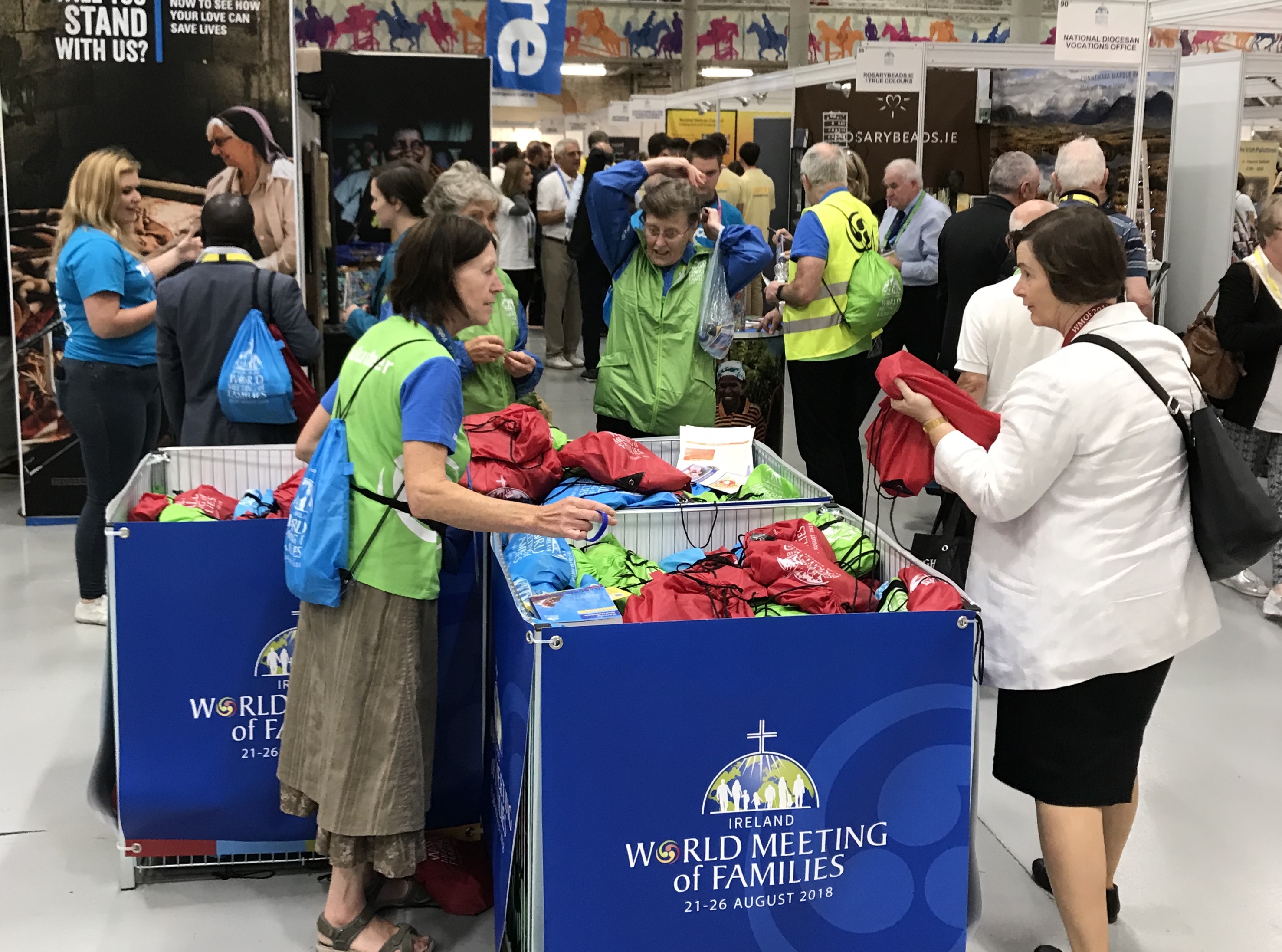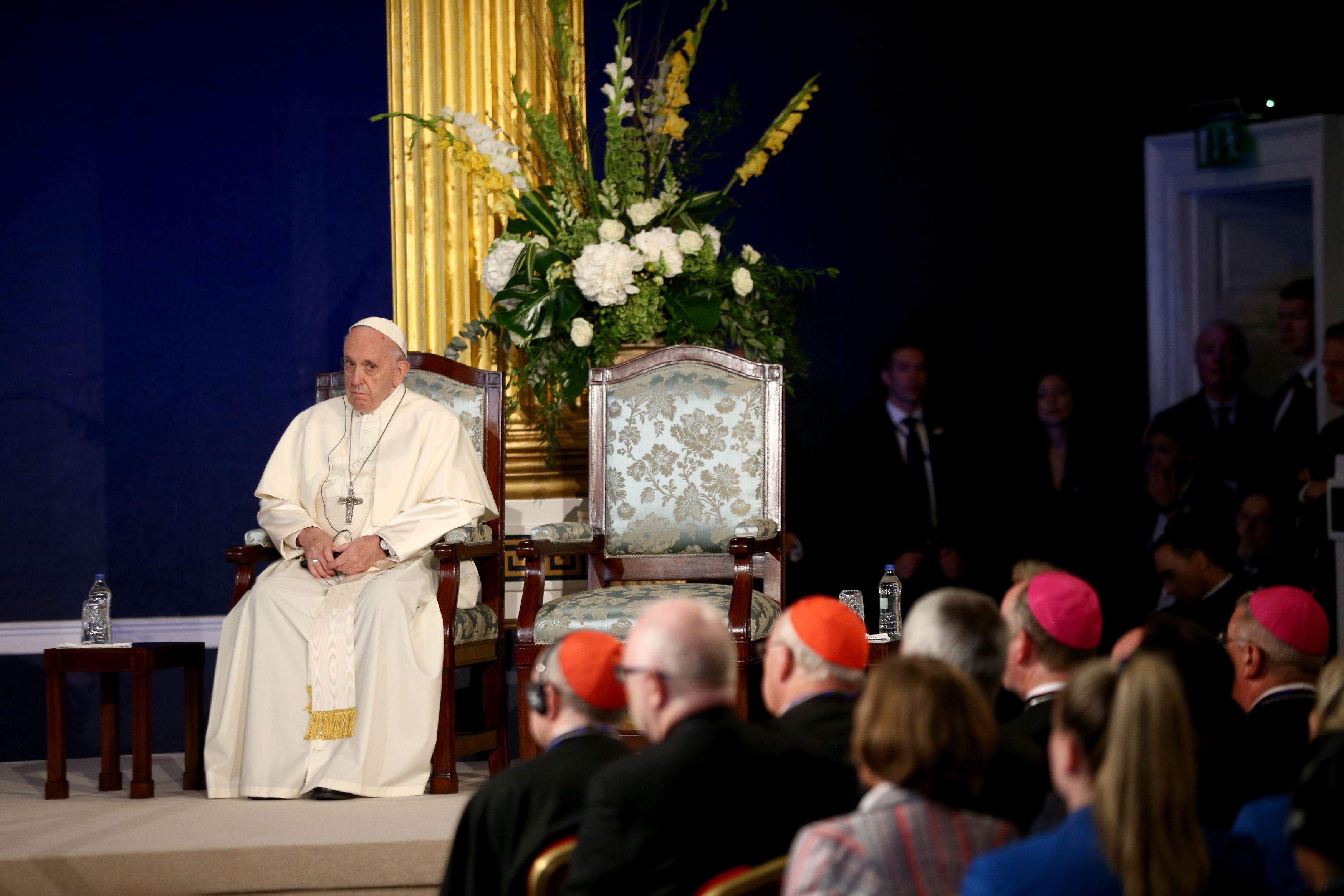Pope Francis kicked off his visit to Ireland by expressing his shame at the failure of the Church’s response to the “repugnant” crime of clerical sexual abuse while saying abuse must be eradicated "at any cost."
He was speaking at Dublin Castle in front of state leaders and Prime Minister, Leo Varadkar, who described past abuse as a “stain” on both the state and the Church before telling Francis how contemporary Ireland had changed so that it welcomed “same-sex couples” and that families come in “many forms.”
While the Pope received a warm, albeit low key welcome, Ireland remains the Ground Zero of the clerical sexual abuse crisis, and Francis trip is a microcosm of the challenges facing the Church in the west, and one of the toughest of his five-year papacy.
The 81-year-old Argentinian pontiff said the abuse scandal highlights the need for adequate child protection across society, and for the Church to adopt effective safeguarding measures. But he stopped short of making any specific proposals or citing any safeguarding protocols that were working effectively.
“I cannot fail to acknowledge the grave scandal caused in Ireland by the abuse of young people by members of the Church charged with responsibility for their protection and education,” Francis said during his remarks in Dublin Castle.
“The failure of ecclesiastical authorities - bishops, religious superiors, priests and others - adequately to address these repellent crimes has rightly given rise to outrage, and remains a source of pain and shame for the Catholic community.”
Citing his recent letter to Catholics across the world, he said he had called for the “eradication of this scourge inside the Church at any cost.”
The Pope then went on to quote from a heavily criticised 2010 letter from Benedict XIV letter to Irish Catholics which Francis described as a “frank and decisive intervention” which “continues to serve as an incentive of the Church’s leadership” in responding to clerical abuse.
The Emeritus Pope’s 2010 text, sent to the Irish church following revelations of widespread cover-ups of child sexual abuse, was viewed as failing to face up to responsibility for the scandal. But Francis cited Benedict XVI’s call for “truly evangelical, just and effective” measures to be taken in response to the “betrayal of trust” caused by abuse.
During his speech, the Taoiseach called for “a new covenant for the 21st Century” between the Church and the state, while emphasising how different Ireland is now from the time that John Paul II visited in 1979.
“Ireland is increasingly diverse,” he said. “We have voted in our parliament and by referendum to modernise our laws - understanding that marriages do not always work, that women should make their own decisions, and that families come in many forms including those headed by a grandparent, lone parent or same-sex parents or parents who are divorced.”
Mr Varadkar admitted that the Church had filled gaps in education and welfare that the government could not fulfill pointing out that it was not until 1947 - 25 years after the state was established - that a Department of Health or a Department of Social Welfare was set up.
He refused to lay the blame for abuse of children solely at the hands of the Church, arguing that abuse carried out in the “Magdalene Laundries, Mother, and Baby Homes, industrial schools, illegal adoptions and clerical child abuse are stains on our State, our society and also the Catholic Church.”
But he also referenced the recent Pennsylvania Grand Jury report into sexual abuse, saying the “wounds are still open and there is much to be done to bring about justice and truth and healing for victims and survivors.”
Mr Varadkar said: “Holy Father, I ask that you use your office and influence to ensure this is done here in Ireland and across the World."
The Pope, who is on a 36-hour visit to Ireland but is not going to Northern Ireland, also used his opening speech to give thanks for the Good Friday agreement which helped end a long-running conflict with religious undertones on the north-south border.
He referred to the pressures on the peace process something which has come into sharp focus following Brexit: Britain’s decision to leave the European Union has thrown a core principle of the Good Friday agreement, that of an open border between north and south, into uncertainty.
“We can give thanks for the two decades of peace that followed this historic agreement while expressing firm hope that the peace process will overcome every remaining obstacle and help give birth to a future of harmony, reconciliation, and mutual trust,” the Pope said.
On board the flight from Rome to London, Francis emphasised the prime motive of his visit was to attend the World Meeting of Families, a gathering of Catholics from more than a 100 countries to celebrate family life.
“I like to be with families, so I am happy about this visit,” he told the 70 journalists travelling with him on the Alitalia plane, nicknamed Shepherd One.
“It touches my heart to return to Ireland after 38 years where I was for three months to practice English. And I remember it well.”
After his plane landed at Dublin airport this morning, he was greeted with a bouquet of flowers from young children before meeting dignitaries. Thee included the Irish Ambassador to the Holy See, and Cardinals Sean Brady, the Emeritus Archbishop of Armagh, Kevin Farrell, Prefect of the Holy See’s Dicastery for Laity, Family and Life, the Archbishop of Armagh, Eamon Martin and the Archbishop of Dublin, Diarmuid Martin.
He was then driven in a Skoda rapid car to “Áras an Uachtaráin,” the residence of the Irish president, Michael Higgins where the pair met and the Pope signed a book of remembrance.
“With gratitude for the warm welcome I have received, I assure you and the people of Ireland of my prayers that Almighty God may guide and protect you all,” Francis wrote.
Later, after arriving at Dublin Castle, the Pope wrote in a similar book of remembrance: “May almighty God bless the Irish people and bestow upon them gifts of peace and joy.”
Francis concluded his speech that the Catholic faith of the Irish people had been “a source of the courage and commitment needed to forge a future of freedom and dignity, justice and solidarity.”
He added: “the Christian message has been an integral part of that experience, and has shaped the language, thought and culture of people on this island.”
This afternoon the Pope will visit Dublin’s pro-Cathedral and a homeless centre before attending an evening gathering to celebrate families at Croke Park.
The Tablet at WMOF2018

The Tablet is at the World Meeting of Families. Come and say "hello" – the main exhibition area - stand 91



 Loading ...
Loading ...